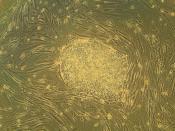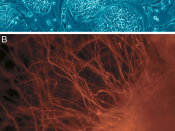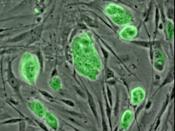Stem Cell is an undifferentiated somatic cell that is capable of either division to give rise to daughter stem cells, or differentiating into any specialized cell type given the appropriate signals. Cultured stem cells are critical to the concept of therapeutic cloning. The benefits of embryonic stem cell research outweigh the moral costs because of the innumerable potential benefits it can provide to the medical community.
There has been much recent debate about the merits, dangers, and nature of stem cell research. Some see in it the answer to every debilitating disease known to man, while others see it as a step away from human cloning. In this paper I will not show the readers my point of view, but I will give them the facts necessary to form their own opinions about one of the most divisive, complex, and potentially life-changing developments in history.
Stem cells are cells that have the remarkable potential to develop into many different cell types in the body.
Serving as a sort of repair system for the body, they can theoretically divide without limit to replenish other cells for as long as the person or animal is still alive. When a stem cell divides, each "daughter" cell has the potential to either remain a stem cell or become another type of cell with a more specialized function, such as a muscle cell, a red blood cell, or a brain cell. (Kocher 62)Recent scientists and researches show the huge benefit of using embryonic stem cell to hold potential cures for spinal cord injuries, multiple sclerosis, diabetes, Parkinson's disease, cancer, Alzheimer's disease, heart disease, hundreds of rare immune system and genetic disorders and much more. Scientists see almost infinite value in the use of embryonic stem cell research to understand human development and the growth and...


